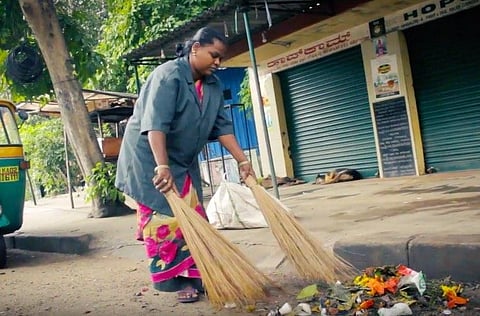

Even as the coronavirus pandemic has resulted in a complete lockdown of India, there are certain essential service persons who continue to toil despite the threat of catching the virus. One such crucial role is played by pourakarmikas, safai karamcharis or the civic workers. These are the people who risk the chance of falling ill and yet continue to collect garbage from households. In order to minimise the risk of them being infected, we as responsible citizens can begin composting wet waste in our own homes and ensure that in times of a pandemic the civic workers don’t have to face such risks.
One may argue that composting requires several items that are difficult to procure in times of a lockdown. TNM brings you simple and easy ways to compost wet waste.
What are the items you need to compost at home?
A bucket, a sharp object to make holes in the bucket, soil/ coconut shells, old newspapers, dried leaves that you can find on your street, cardboard and a pipe. You will also need used tiles or plastic plates. If you don’t have a pipe, you can cut a thin plastic bottle into a pipe. Most of these items are easily available in your home.
How to segregate?
First, you must segregate your dry and wet waste. Wet waste includes all biodegradable waste like cooking waste (vegetable peels etc) and left over food. If you have milk packets, juice cartons etc, rinse them, dry them and then put them in your dry waste bin. Do not mix meat waste with the wet waste you use to compost. It will smell, and attract flies and maggots. You can dispose of the dry waste once in a week. Leave the dry waste bag near your gate or place where the pourakarmikas can see it and take the bags. Avoid handing it over to them directly.
How to compost?
> Make a hole in two plastic buckets, one or one-and-a-half inches above the bottom of the bucket.
> Attach the pipe/cut plastic bottle to these two holes in the two buckets so they are connected with the pipe. This will drain out the leachate water.
> Make smaller holes in one of the buckets on the sides. This is the bucket that you will have to put your waste in. The holes allow for air to enter and reduce the smell.
> Put broken tiles or waste plastic plates at the bottom of the bucket with holes. Add coconut shells on top of the plates. Add two or three newspaper sheets on it. Put your wet waste on top of this. Add another layer of coconut shells/newspapers or dry leaves on top of the waste.
> Keep building these layers -- one of wet waste and one of newspapers and/or coconut shells until the bucket is full.
> Once the bucket is full, pile six or seven news paper sheets, cover it with a hardboard.
> It takes over three months for compost to form.
> This should not smell more foul than your normal wet waste bin.
Soil is ideal as filling/brown matter for people living in buildings that don’t have adequate ventilation and also for those who don’t have a backyard to compost waste. Soil absorbs the smell easily. If you don’t have soil, especially during a lockdown, dried leaves and newspapers are a good substitute.
> If your compost bin is smelling, that means your waste-to-newspaper/coconut shell/dry leaves ratio is not right. Just add more brown matter -- such as dry leaves or coconut shells -- than you already have to reduce the smell. Brown matter ensures that the wet waste breaks down properly without smelling.
> You can use the leachate water and mix it with the soil if you have potted plants at home. Dispose this daily or the area where you keep the compost bucket will smell.
> It will take three months for the compost to form. You can use this for your garden or potted plants.
> Sometimes, if your house does not have enough ventilation, the smell of compost can waft into your house. Keep the bucket in the balcony. If you cannot stand the smell, put a few red hot coals in a plate and keep it next to the bucket for 30 minutes to an hour. If you don’t have coals, then light four or five incense sticks and keep it next to the bucket.
This process may seem long and tedious but the jobs that pourakarmikas are performing are also long and tedious. It's about time we try to help them in any way we can.
With inputs from Sowmya Rajendran